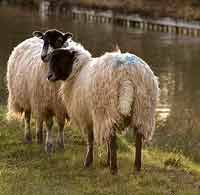Keep an eye on liver fluke to prevent costly losses

Sheep and lamb losses have made controlling liver fluke a top priority at Langford Farm, Northwich, where 30 ewes and lambs have been lost over the last month.
The Cheshire farm is RDPE Livestock Northwest’s new beef and sheep monitor farm for Cheshire and Merseyside and is part of a three year project run in conjunction with Reaseheath College, Nantwich.
Speaking at the launch meeting for the project, the farm’s vet, Darrell Irwin, Willows Vet Group said most recent stock losses had been linked to the liver fluke parasite.
Farmer, John Gate, has also learned a number of lambs sold to local butcher and going through the abattoir had livers that were condemned due to liver fluke.
However, the fluke problem had only been highlighted relatively recently, says Mr Irwin. “A post-mortem of an extremely ill sheep revealed her liver contained hundreds of flukes, even though she had been treated, along with the rest of the flock, shortly before.
“The case is almost certainly a case of resistance to the drugs used. However, the level of infection was such that the fluke must have been present in that sheep for some time.”
Blood tests on out-wintered cattle also showed some had been exposed to liver fluke and consequently were brought into the liver fluke control programme.
“It is often not obvious when livestock are infected with fluke, with sheep tending to show signs more clearly than cattle,” says Mr Irwin.
“Blood tests would indicate reduced liver function and faecal sample would indicate the presence of eggs.”
Any suggestion of fluke should be checked by a vet and where fluke is a problem, control strategies should be put together on an individual farm basis. This will normally include a rotation of treatments to reduce the risk of disease resistance.
